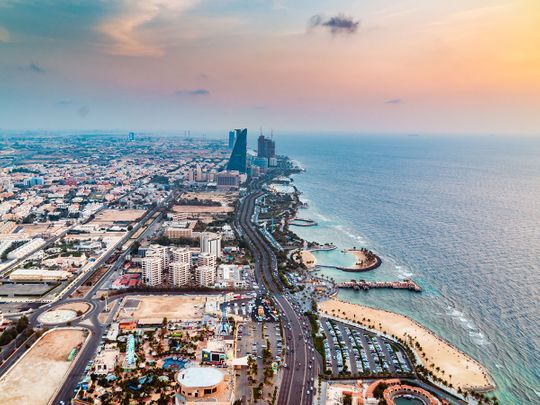
Dubai: The softening in oil prices hasn’t had an effect on Saudi business sentiments, with activity only slightly down from the October highs, according to the latest PMI (Purchasing Managers Index) data from Riyad Bank.
Businesses were quite confident about the immediate future, with the Saudi economy putting in additional projects and funds to back them up. In fact, sentiments among business owners (in the non-oil sector) closed November at its highest point in 5 months.
This has been the mood right through 2023, for the most part, and the banking, construction and startup categories should close the year in good order.
“Firms anticipate a continuous increase in output, fuelled by a robust inflow of new projects,” said Naif Al-Ghaith, Chief Economist at Riyad Bank. “Manufacturers, in particular, are highly optimistic about the next 12 months, as they anticipate a favourable business climate.
“Additionally, the wholesale and retail sectors also show promising signs, aligning with the overall positive sentiment. This bodes well for Saudi Arabia's economic growth and suggests a favourable environment for businesses in various industries.”
November PMI
Coming to the monthly reading on business activity and sentiments, which is what the PMI is about, the November reading shows a score of 57.5, down from October’s buzzing 58.4, but still more than good enough to keep activity ticking along. The drop, according to Riyad Bank, had to do with ‘moderation’ in the rate of staff and inventory growth.
"New order intakes continued to rise considerably as companies highlighted improvements in market conditions, customer numbers and investment spending," the report notes.
Manufacturers, in particular, are highly optimistic about the next 12 months, as they anticipate a favourable business climate
Weaker exports
Where it slackens is on export orders. “The new export figures have remained relatively low to be in line with the non-oil exports figures posted by GASTA,” said Al-Ghaith. “This weak performance in exports can be primarily attributed to the petrochemical sectors as this sector represents more than 29 per cent of non-oil exports.”
Costs are increasing...
Input costs across sectors are rising, only partially offset by the cost in fuel and transportation expenses. But Saudi businesses, as a rule, seem to be restraining themselves from passing on the higher costs to customers. The most likely reason is that businesses do not want to see any slack in customer demand so close to the start of a new year.
"Due to competitive pressures, the impact on overall prices has been somewhat subdued," said Al-Ghaith. "This month (November), output prices recorded an increase, yet one that was slower than the increase in input prices."
There could be a repeat of that in the December PMI readings too...











